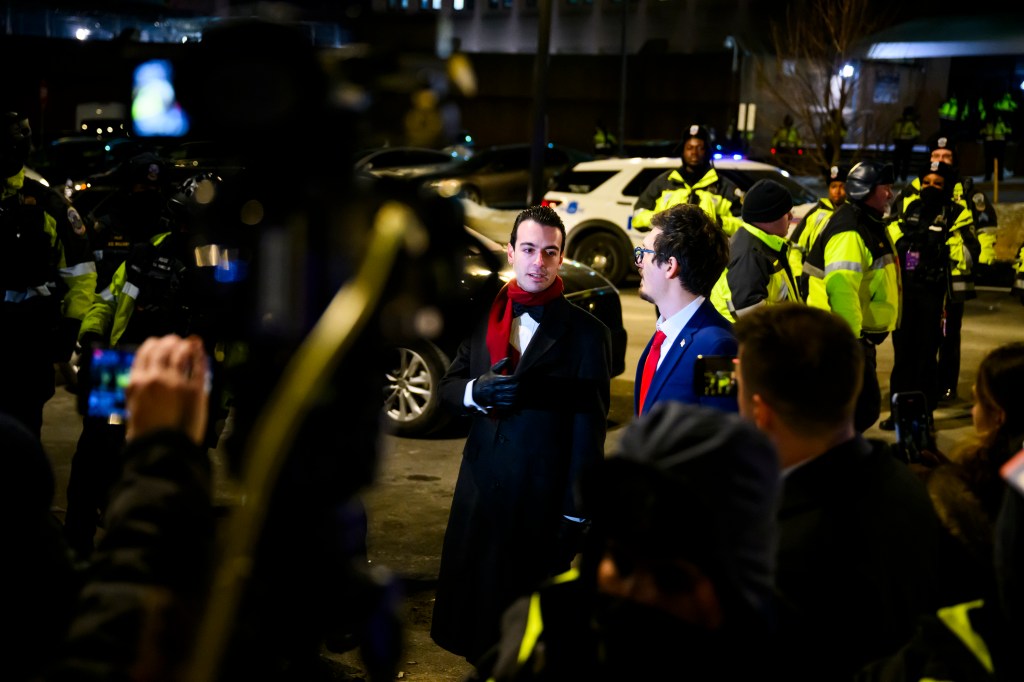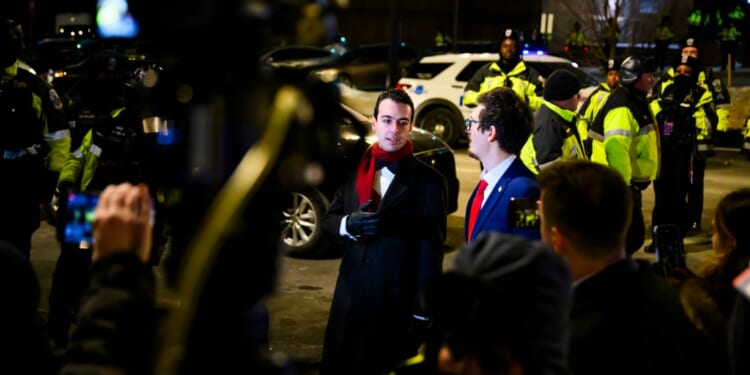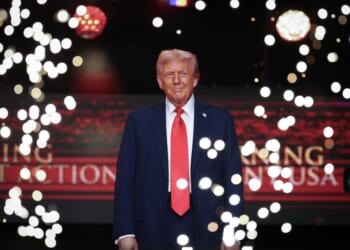
But today brings good news, I’m happy to say: The despicable turncoat cowards of the Senate GOP have finally found a reason to fight the bear.
That reason is Paul Ingrassia, about whom I wrote a bit in May when he was nominated to lead the Office of Special Counsel. Like so many Trump toadies, Ingrassia is more bear than man; yesterday Politico blew him up by publishing a private group text in which, among other things, he allegedly used an Italian slur for blacks, said the Martin Luther King Jr. holiday should be “tossed into the seventh circle of hell,” and admitted to having “a Nazi streak.” At one point, he helpfully reminded others in the group to “Never trust a chinaman or Indian. NEVER.”
That’s the second text chain in less than a week that Politico has obtained in which up-and-coming young Republican operatives have sounded, well, Klan-ish. The editors should make it a regular feature; there seems to be no shortage of material out there.
The Office of Special Counsel, by the way, is an agency devoted to ethics. “OSC’s primary mission is to safeguard the merit system by protecting federal employees and applicants from prohibited personnel practices (PPPs), especially reprisal for whistleblowing,” the office’s web page explains. Wanting a goblin like Ingrassia in charge of that mission is a blatant case of appointing a fox to guard a henhouse. His task there, obviously, would be to expose and persecute anyone foolish enough to come forward and formally complain about malfeasance by Trump’s administration.
It’s all too much for the Benedict Arnolds of the Senate. “He’s not gonna pass,” Majority Leader John Thune told reporters of Ingrassia. Sen. Rick Scott, normally a reliable Trump henchman, is also a no: “I’m not supporting him. I can’t imagine how anybody can be antisemitic in this country. It’s wrong.” Stalwart conservatives like Sen. Ron Johnson and Sen. James Lankford also appear to be lost causes. Ingrassia looks cooked.
But why? Why is his nomination a red line for the czarists of the United States Duma?
Corrections.
“Confirming him would be terrible politics,” you might say. “Voters would be angry if Republicans rubber-stamped a guy with an admitted ‘Nazi streak.’”
They would? I’m afraid you’ll need to show your work on that.
Trump has already installed people in his administration whose views tend toward Klan-ishness. He’s reportedly weighing a new refugee policy that would heavily favor white people claiming persecution by nonwhite governments. Last month at Charlie Kirk’s memorial service he shared a stage with his longtime pal Tucker Carlson, who now spends his days just-asking-questions about why Ashkenazi Jews are so resilient against the COVID virus.
None of it seems to matter. Most Americans appear completely checked out from the administration’s daily moral transgressions. Maybe their reservoir of Trump outrage has already been spent, or maybe they made peace with the fact that electing a criminal who leads a movement of fascists would necessarily mean accepting a new normal in disgusting behavior by the government and its allies. Or maybe they’re so siloed off from inconvenient facts by the bespoke realities they’ve created for themselves that they’ve never heard of Paul Ingrassia and never would hear of him even if he were confirmed.
Trump’s approval rating has actually risen lately despite the ongoing government shutdown, a looming unauthorized war with Venezuela, and the flagrant persecution of his enemies by the Justice Department—and you’re telling me the fate of a nominee to lead an obscure office might be some sort of red line for voters that at last awakens them from their civic coma?
There’s no way. The Senate’s resistance to Ingrassia can’t be about politics.
I think it’s about saving face institutionally. It reminds me, in fact, of a complaint that conservatives have made for years about the left.
Back in the Before Times, when right-wing blogs weren’t yet the preposterous propaganda outlets they accuse the establishment press of being, conservative pundits frequently criticized the media for being selective about which corrections it was willing to run. For instance, a story about Israel and the Palestinians that blatantly favored the latter would never be corrected by a newspaper because the liberals in charge would never confess to the journalistic mortal sin of bias.
But if that paper committed a venial sin, such as by misspelling someone’s name in the piece? The editors were always willing, even eager, to correct that.
Admitting to minor mistakes while ignoring major malfeasance created a self-serving illusion of accountability, conservatives noted. By calling attention to its trivial oopsies, the media misled its audience into believing that it was also being rigorous and conscientious in policing for more meaningful errors. Ticky-tack corrections were a fig leaf to hide serious ethical corruption.
Which is also how it is in the U.S. Duma now, no?
The illusion of accountability.
Point to virtually any aspect of government and you’ll find the president seizing power that constitutionally belongs to the legislature while Republicans do nothing. The power to declare war, the power to spend, the power to tax: That’s most of what Congress is supposed to do and Trump is doing all of it. Point to any arm of the executive branch, meanwhile, and you’ll find power being abused for political advantage. Dubious DOJ criminal investigations, harassment of activist groups by the IRS, a wildly renegade immigration secret police force: Congress has oversight over all of it and isn’t doing jack.
Yet, somehow, John Thune and the gang are dead set against letting this Ingrassia fellow take charge of the Office of Special Counsel.
That’s Senate Republicans’ version of a newspaper correcting the spelling of someone’s name to lull you into ignoring its more egregious political bias. Trivial corrections are the editors’ way of pretending they care about accuracy; rejecting Ingrassia is the Senate’s way of pretending that it’s still conducting oversight of the administration and checking Trump. If Congress were the Duma, it wouldn’t dare say no to one of Vladimir Putin’s nominees, right?
But actually, it would—if doing so served Putin’s long-term interests. Whether Trump understands it or not, occasional token acts of resistance by Congress are good for him, for the GOP, and for postliberalism. They sustain the charade that the government is still running the way it always has. (No kings!) And they legitimize his previous power grabs by drawing an implicit contrast with the passivity Congress showed during them.
A newspaper that makes a trivial correction means to imply that it would certainly correct bigger errors, and therefore that there mustn’t be any such major errors to correct. The same here with our Duma: If the Senate has been roused by something as trivial as the Ingrassia nomination but not by Trump, say, unilaterally waging the dumbest trade war in history, it must be that there’s nothing too legally or politically objectionable about the latter.
If you doubt the value of token acts of legislative resistance to an autocrat, just look at how well having to pull Matt Gaetz’s nomination for attorney general has worked out for Trump. By making a rare fuss about him, Senate Republicans spared the president (and themselves) Gaetz’s freight train of personal baggage and ended up with a lackey in Pam Bondi who’s every bit as servile as Gaetz would have been. Even better, having supposedly proved their institutional independence by blocking him, they bought themselves political cover to dutifully rubber-stamp lackwits like Robert F. Kennedy Jr., Pete Hegseth, and Kash Patel.
Paul Ingrassia is another Senate sacrificial lamb to political regularity. He’s the guy you tank when you’re not allowed to complain about the president firing ethical lawyers and hiring conspiratorial ones. He’s the hill you die on when you’re not permitted to notice that one of the January 6 miscreants whom Trump freed has now been arrested for threatening to kill Democratic Minority Leader Rep. Hakeem Jeffries—by state authorities, thank God, or else the guy might be pardoned again.
The path to Duma-fication is smoother, ironically, when Congress occasionally pretends like it’s still Congress.
Moral obliteration.
One is that Ingrassia will end up somewhere in Trump’s administration anyway, albeit in a position that doesn’t require Senate confirmation. The president won’t let a little something like “a Nazi streak” deter him from making use of a guy who once said, “Trump is the Constitution.” The only sin in fascism is disloyalty, and Ingrassia certainly isn’t guilty of that.
And when he does end up in some exalted advisory position in the executive branch, it’s a cinch that the Duma won’t lift a finger to prevent it. Which it could: Contrary to what John Thune might tell you, Congress does have leverage over the White House that it could use. “Fire all the guys with Nazi streaks or we’re rescinding your tariff powers,” Republicans might say to the president.
Not saying it is a choice, and it’s the choice Thune and his conference will make. They play the same institutional role in the GOP that anti-anti-Trump conservatives play in the broader Republican coalition, pretending that bovine quiescence toward the president’s worst actions renders them blameless so long as they don’t actively abet him. They refuse to confirm Paul Ingrassia; what more do you want from them to prevent the government from being run by white nationalists, for cripes’ sake?
Here’s a question, though: Why Ingrassia? Of all the opportunities congressional Republicans have had or will have to make token shows of resistance to fascism, why have they zeroed in on this admittedly stellar specimen of a young, heedless far-right chud as a bridge too far?
One possibility, per Rick Scott’s comments about him, is that the institutional GOP simply won’t tolerate overt antisemitism in an appointee. That’s not because it has a strong moral compass—on the contrary, as this column demonstrates—but because antisemitism is a useful political cudgel against the left. The White House has extorted left-wing universities and sought to bar immigrants from the country ostensibly for demonstrating hostility to Jews but really to advance its ideological agenda. Antisemitism is useful moral cover for a form of hardball partisan politics that might otherwise make Americans uncomfortable.
Senate Republicans aren’t going to discard that cover for a scrub like Ingrassia.
If that’s not the explanation, though, then it might be that he’s the rare Trump nominee who’s so comprehensively disgusting that he fails even the Senate’s all-but-unfailable puke test. The Republicans of the Duma can and will confirm you to high office if you’re an authoritarian fanatic; all 53 members of Thune’s conference voted to confirm Russell “Project 2025” Vought to lead the Office of Management and Budget in February, for example.
But when you’re an authoritarian fanatic who’s also personally seedy, like Ingrassia and Gaetz? Eh, that’s too much. If we’re to have fascism, it seems, we must insist on decorum among its handmaidens. The Benedict Arnold caucus will do its best to ensure that only upstanding members of right-wing society are tasked with carrying out the president’s illegal orders and unconstitutional power grabs.
And so we come to a cliffhanger: Will Trump defy the warnings from Thune and stand by Ingrassia’s nomination, daring Republicans to vote him down?
I’m guessing no. (There’s no word yet as I write this on Tuesday afternoon.) Again, these token shows of congressional resistance are arguably good for him, and Ingrassia isn’t so valued a nominee that the president should logically feel obliged to insist on him. There’s no need to confirm anyone to lead the Office of Special Counsel at this point, frankly: No would-be federal whistleblower with a grievance against Trump’s government would dare make himself or herself known to that agency.
But there’s a chance that the White House will go to the mat for Ingrassia, for two reasons. One is to remind the Duma that, as some in the West Wing have reportedly been heard to half-joke, Trump rules it with an “iron fist.” We’ve reached the point of autocratic power consolidation where the president might object to being told no by Congress on principle, not because he’s invested in Ingrassia but because he’s invested in the idea that no one gets to tell him no.
Beyond that, it may be worth something to Trump to force-feed Republicans the idea that Paul Ingrassia is the new baseline for moral acceptability in the party.
That possibility interests me for the same reason that it interests me to hear he might commute the federal prison sentence of Sean “Diddy” Combs for sex offenses. Combs isn’t some diehard Trump loyalist like George Santos or the January 6 droogs, so there’s no reason to “reward” him with clemency. If he’s sprung, it’ll be to underline the point that Trump doesn’t actually need a justification for freeing criminals. It doesn’t matter what the legal or moral case against someone is. He’s the king, and the king doesn’t need to explain himself.
That’s the same logic that could justify a confirmation fight over Ingrassia. The king wants what the king wants and it’s not for the Duma to ask why.
Trumpism is a moral project rather than a political one, I keep saying, and the endgame of that project is to obliterate moral standards so that there’s no code of conduct to which the leader and his movement can properly be held. When you elect bears, the bears’ highest priority will be to normalize eating people. The question for the Ingrassia skeptics in the Senate is this: In a government that’s already full of bears, what’s one more?
















